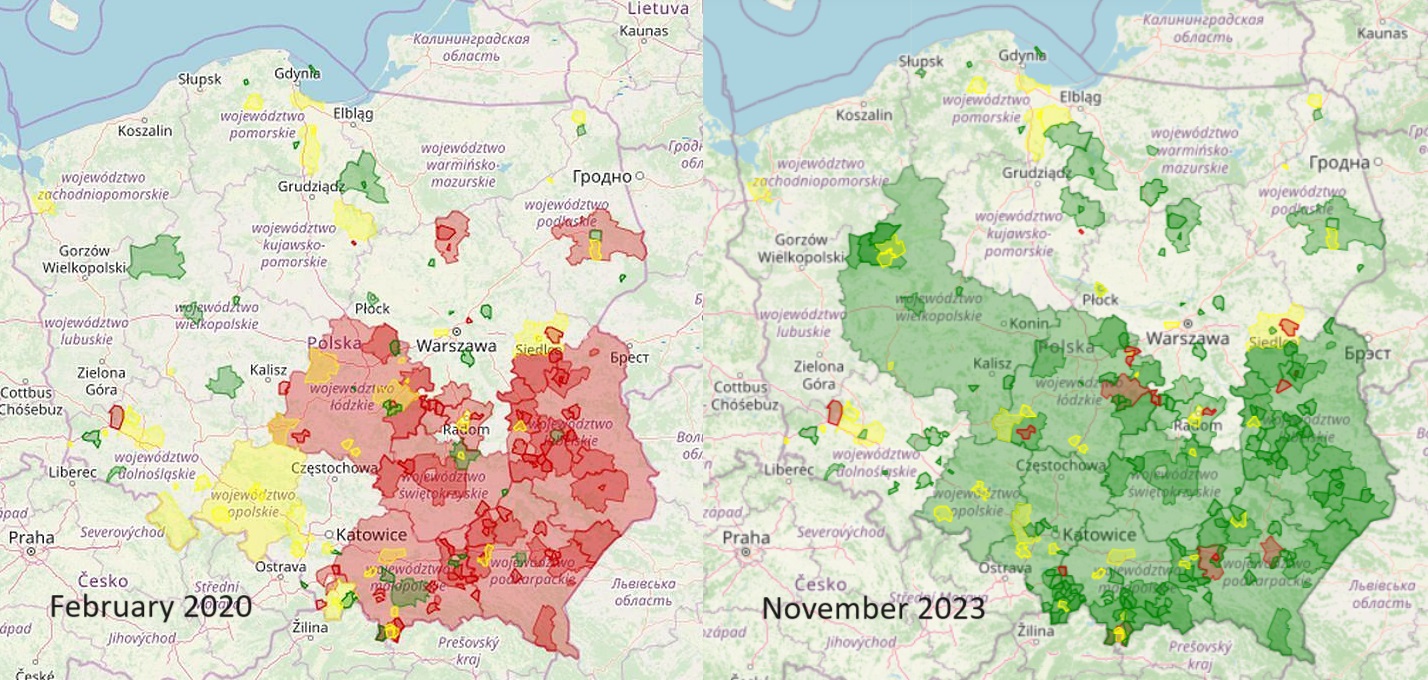A local authority that was the first in Poland to adopt a resolution declaring itself “free from LGBT ideology” has voted to withdraw the measure. It did so under the threat of losing millions of zloty in EU funding over the issue.
Activists involved in tracking the anti-LGBT resolutions passed by Polish local authorities report that, of the 105 initially introduced in 2019 and 2020, currently only 15 remain in force. As well as being withdrawn under financial pressure, some have also been overturned by court rulings.

The Atlas of Hate showing local authorities in Poland that have enacted anti-LGBT resolutions (in red) and those that have rejected or withdrawn them (in green) in February 2020 (left) and now (right). Areas in yellow show where lobbying for such resolutions has taken place.
On 26 March 2019, Świdnik county, an area of around 70,000 people in eastern Poland, was the first to pass such a resolution. It declared itself “free from LGBT ideology” and pledged to prevent “the sexualisation of Polish children” in schools through “homopropaganda”.
The measure was passed with the votes of local councillors from the conservative Law and Justice (PiS) party, which has been in government at the national level since 2015 and has during that time led a vocal anti-LGBT campaign.
The resolution in Świdnik was proposed by Radosław Brzózka, a local councillor and now chief of staff to PiS education minister Przemysław Czarnek. The minister has himself called LGBT people “deviants who do not have the same rights as normal people”.
Poland remains the EU's worst country for LGBT people, according to the annual Rainbow Europe ranking https://t.co/j83yAOtrcT
— Notes from Poland 🇵🇱 (@notesfrompoland) May 11, 2023
However, last week, a local councillor in Świdnik, Jakub Osina, announced that the resolution has now been repealed and replaced with one that makes no mention of LGBT issues but pledges to protect “the moral development of the young generation and the institution of the family based on Christian values”.
News website OKO.press notes that the change was made after Świdnik saw an application for 3.6 million zloty (€810,000) in EU funds rejected because the money could only be granted to entities that comply with anti-discrimination regulations.
In July 2021, the European Commission launched legal proceedings against Poland due to its anti-LGBT resolutions, which it argued “may violate EU law regarding non-discrimination on the grounds of sexual orientation”.
Soon after, Brussels “put on hold” funding for Polish regions that had passed such resolutions, who were informed that “declaring LGBTIQ-free/unwelcome territories…constitutes an action that is against the values set out in the Treaty on European Union”.
Three further regions in Poland have withdrawn their anti-LGBT resolutions, joining one that did so last week.
They were among five provinces threatened with the loss of EU funds over the issue https://t.co/5pPv0Dv8DH
— Notes from Poland 🇵🇱 (@notesfrompoland) September 28, 2021
The EEA and Norway Grants programme, which provides funds to Polish local authorities, also announced that it would not finance projects run by places that have passed anti-LGBT resolutions.
The threat of losing funds led many Polish local authorities to begin repealing the resolutions. That included the town of Świdnik, which had passed its own resolution, but until now not the surrounding Świdnik county.
In April this year, a first effort was made to repeal the resolution and replace it with one that retained a similar meaning but removed the words “LGBT ideology” and “homopropaganda”, reported OKO.press
However, that attempt was thwarted by opposition councillors, who “did not want to let PiS get away so easily with the resolution they have defended for a long time”, according to LGBT rights activist Bart Staszewski.
One of the first towns in Poland to declare itself "free from LGBT ideology" four years ago has now replaced that resolution with one expressing opposition to discrimination against sexual minorities.
The decision came amid fears over losing EU funds https://t.co/iaqvMdUarz
— Notes from Poland 🇵🇱 (@notesfrompoland) January 7, 2023
Councillors from the centrist Civic Platform (PO), the main opposition party nationally, told newspaper Gazeta Wyborcza that, before allowing the resolution to be withdrawn, they wanted PiS officials to admit their mistake and apologise to those hurt by it.
But now the council has agreed to repeal the old resolution and replace it with one worded completely differently. The decision comes a few months before local elections.
Earlier this year, it was reported that the EU had ended its legal action against Poland regarding the anti-LGBT zones. It did not give a reason for its decision.
The EU last month quietly ended its legal action against Poland over anti-LGBT resolutions passed by local authorities.
Polish LGBT groups have voiced concern at the decision, noting that many areas continue to declare themselves free from "LGBT ideology" https://t.co/xIXSzbvBSe
— Notes from Poland 🇵🇱 (@notesfrompoland) February 16, 2023

Notes from Poland is run by a small editorial team and published by an independent, non-profit foundation that is funded through donations from our readers. We cannot do what we do without your support.
Main image credit: Jakub Orzechowski / Agencja Wyborcza.pl

Daniel Tilles is editor-in-chief of Notes from Poland. He has written on Polish affairs for a wide range of publications, including Foreign Policy, POLITICO Europe, EUobserver and Dziennik Gazeta Prawna.



















